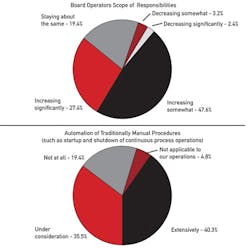Control, ABB Collaborate on Operator Effectiveness Research
Process control operators are being assigned more tasks, but luckily they're getting more help to do them. That's just a couple of the early findings of a joint "Operator Effectiveness" research study by Control and ABB, which polled across Control's global process industry readership.
In general, more than 25% of respondents say board operator responsibilities are increasing in the plants where they work, while almost half say operator responsibilities are increasing somewhat.
To educate these operators, more than 72% of the readers surveyed report that their organizations use "on the board" training with experienced operators as their primary training tool, while more than 40% each use classroom and self-directed online training as secondary methods. Meanwhile, more than 18% use full-process and operation-station simulation as their primary training tool, and almost 25% use simulation as their secondary tool.
To design user interface screens for tasks like graphics, navigation and alarm management, 40% of the respondents report using recommendations from the International Society of Automation (www.isa.org), while about 15% each use guidance from the Abnormal Situation Management Consortium (ASMC, www.asmconcortium.net), Engineering Equipment and Materials Users Association (www.EEMUA.co.uk), and the U.K.-based Health and Safety Executive (www.hse.gov.uk).
As for ergonomic features in their control rooms, 75% of the respondents use adjustable seats and consoles; 70% have optimized screen navigation and interaction, such as configurable short-cut keys and one keyboard for multi-screen displays; 43% use adjustable lighting; 33% have micro-ventilation and/or ambient temperature control; and 12% use directional sound.
Finally, 40% report that they've extensively automated traditionally manual procedures, such as start-up and shutdown of continuous process operations, while 35.5% say it's under consideration, and 19.4% haven't done it at all.
This is just a sampling of the findings of Control and ABB's "Operator Effectiveness" study. Full results will be presented in a supplement in Control's May 2012 issue.


